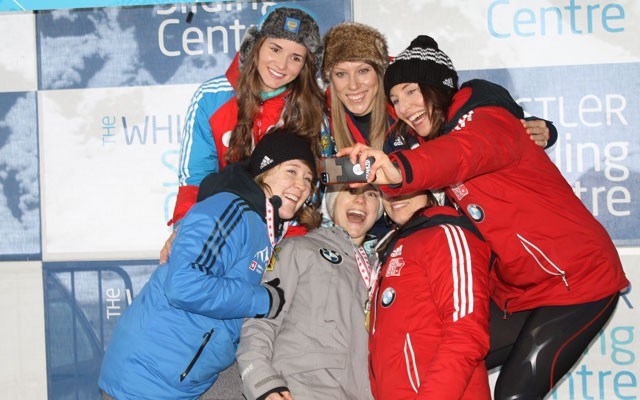I'm not going to make too much out of a selfie.
I hope.
But I'll admit, when Canadian skeleton athlete Cassie Hawrysh whipped out her cell phone on the podium at Whistler Sliding Centre in January and took her own shot with the five other medallists, it got the ol' mind-wheels turning a little bit.
Hawrysh posted the photo to her Twitter account, tagging that she had promised the photo to Canadian ice dancers Kaitlyn Weaver and Andrew Poje. Promise kept, it was an odd sight after the six had just posed for a firing line of camera flashes.
At a certain level, too, it's a footnote in the developing story of athletes continuing to amplify their own voices and brandish their own lenses.
Of course, athletes, along with politicians, actors, rock stars and other public figures have released late- or post-career memoirs for decades, but there's something fresh about athletes, in particular, speaking out during their careers. I first noticed the trend back in 2006, when MLB relief pitcher Pat Neshek, then a Minnesota Twins rookie, not only had a website but ran a message board on which he regularly posted. That same year, New York Yankees pitching prospect Phil Hughes also launched a site and message board. Neshek, in particular, opened himself up, chatting frankly about his career, his love of heavy metal and autograph collecting, even using the board to acquire new John Hancocks.
Just a few years later, Twitter hit in a big, big way, gathering sport's brightest stars — LeBron James, Alex Ovechkin and Russell Wilson are all among the verified users, though, more often than not, little of consequence is said on the site.
Former NHL goalie Dan Ellis was essentially chased off the site with pitchforks after bemoaning the challenges of living off a multi-million dollar salary in 2010. Former Minnesota Vikings punter Chris Kluwe went the other way, as he's theorized that he was given his walking papers for his willingness to be vocal about issues close to him on platforms like Twitter and sports gossip site Deadspin, where he's published op-eds. One of those op-eds discussed the homophobic nature of the Vikings' locker room, and some responses defended the team's coaching staff while others chastised Kluwe's alleged willingness to join in at times. At any rate, Kluwe hasn't been silenced, continuing to use Twitter to comment on everything from police shootings to promoting women's rights.
Several players have published their own thoughts on other platforms. After last year's NFC Championship win, Seattle Seahawks cornerback Richard Sherman came under fire for his loud and passionate television interview with Erin Andrews after he shut down San Francisco 49ers receiver and major rival Michael Crabtree, making a late game-saving play. Sherman was quickly denounced as a "thug" by several commenters on Twitter, and he was given the chance to respond in his own words in Peter King's Monday Morning Quarterback column for the Sports Illustrated website the next day.
"Judge a man by what he does off the field, what he does for his community, what he does for his family," Sherman implored in the column.
Legendary Yankees' shortstop Derek Jeter has gone a step further, as he launched The Players' Tribune last October. Since then, retired NBA player Jason Collins wrote about interacting with police officers as a black man, former NHLer Igor Larionov described his early years growing up as a hockey player in Russia and in probably the most touching piece yet, Pittsburgh Penguins forward Pascal Dupuis described trying to play through life-threatening blood clots.
This content, in all likelihood, isn't emanating directly from most players' fingertips. Theories have ranged as to whether their agents ghostwrite their stories, or whether the bylines should be going to members of a new-media firm.
With these emerging platforms for content, it's great to see these opinions come to light. But it's not hard to wonder whether these will be the lone voices in the end.
The NBA's New York Knicks have been lambasted for their atrocious media policies for years, while Dallas Mavericks owner Mark Cuban once mused on his blog about the value of allowing access to print, online and television outlets.
Local sports media in any town is far from perfect — it can range from the vitriol and antagonism between the Toronto Maple Leafs and those who cover them (which was on full display last week when star Joffrey Lupul tweeted "Get familiar with #nocomment" after TSN aired a fan's joking tweet alleging an affair between him and captain Dion Phaneuf's wife) to the overly comfy homerism of broadcasters like Jack Edwards of the Boston Bruins or 'Hawk' Harrelson of the Chicago White Sox. Done diligently, though, local media serves as a thoughtful critical resource for fans.
This new content and perspective is all a fascinating part of an ongoing dialogue, but hoo boy, if it becomes the only voices in the conversation at the expense of experienced beat reporters, the fan giving up their almighty dollars for season tickets will suffer most.




